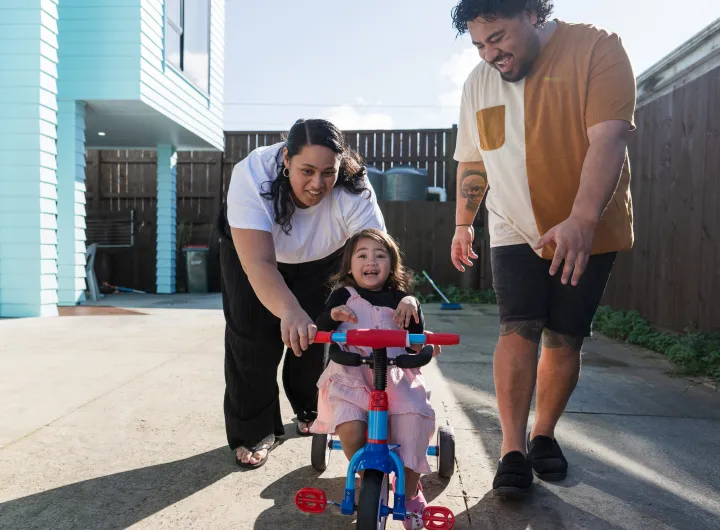The day-to-day challenge of finding balance

Finding ‘balance’ in our lives can feel like a daily challenge. We might imagine it as an evenly weighted set of scales, with one side holding up parenting and family time, while the other side carries everything else – be it our workday, study, the endless housework, maybe even time for self-care and interests. Sounds nice, doesn’t it? But is this type of balance realistic for parents? Well, that might depend on how we look at it…
What if we reframed finding balance as an attitude or a choice?
Whether you are a sole or single parent, have a new baby, one child, lots of children, and/or a child with disability or additional needs, it is understandable if it seems tough to find harmony between caring for them and everything else in your life. You might think all the usual talk around family or work life balance and deep breathing and relaxing doesn’t really cut it if you feel like an overwhelmed parent, managing the stresses of life. You’re not alone. In a recent survey, parents said their biggest challenge was juggling work and whānau commitments with looking after their physical and mental health.1
It may not be easy, but a positive life balance is linked to better wellbeing and quality of life – for you and your children.2,3 On the other hand, lower life balance can have a negative impact on our mental health, family relationships and our children’s development.2,3 Research shows that children with parents who find it hard to manage family and work have poorer mental health.3
There may be benefits to balance, yet how do we actually achieve it? There is no right answer, it depends on what works for you. The important thing may be to choose to try. Balance looks different for everyone based on you and your family’s values.4 The key to it may be to think of this idea as a daily choice or attitude to take, rather than an end goal to reach that may not be realistic. We may never get the scales exactly even between family time and everything else, or not every day at least. But that may not be the point. If you are satisfied with how you spend your day based on what matters to you, you will likely feel happier and be a more positive parent.4
What might ‘balance’ look like for you? You could start by asking yourself a few questions.
How balanced is your life right now? A lot, a little, not at all?
If you said only a little or not at all, you might like to think about what doesn’t feel balanced for you right now, to help make changes. It could be the mental load of running the house, which can be particularly relevant for stay-at-home parents or those on parental leave. For working parents, maybe you feel guilty and want to be able to spend time at home more with your family members. For sole or single parents, you could feel like you have no time for yourself or flexibility, especially if you don’t have much of a support network. Or, maybe you have a child with disability and are experiencing additional challenges with finding balance.5 Whatever your situation is, making changes – even small ones – could have a big impact on your wellbeing.
What could you do every day to make your life feel more balanced?
It’s important to remember there is no perfect parent or perfect life. Some days may feel more balanced than others. The point is to think about how you can help yourself feel calmer and more relaxed on a regular basis. By prioritising your own needs and mental health as much as you do your kids and everything else in your life, everyone wins. Again, balance means different things to everyone, so you choose what works for you and your family situation. Here are some ideas you could try to get started.
Five tips for finding balance and improving your mental health
- Self-care and small daily habits: Self-care is about finding something you enjoy, that can help relax your nervous system, or to feel like your best self. Little changes every day can add up. Waking in the morning before the kids to have a hot drink or some time on your own. Listening to a podcast on the way to work or to do the school/childcare drop-offs. Reading a book or watching funny videos after the kids are asleep. Doing one small thing for yourself every day can make a difference to your mental health.6
- Set clear work expectations: Having realistic expectations for what you can achieve at work is important. Lean on your work relationships and be honest about your needs if you are wanting to spend more time with whānau or reduce your workload. If you have the option, you could discuss flexible work arrangements like the ability to work from home. Where that’s not possible, consider how to separate work from your home life, with clear expectations and boundaries for both roles.4 Also, when you are at work, it can help to try and engage in your job and the goals you might have in your role while you are there. This can reduce feelings of guilt about not being home and help you to feel more fulfilled with how you spend time away from your family.
- Be grateful for the good: Being grateful for what we have and focusing on the positives can improve our wellbeing and make our lives feel more balanced. You might be grateful for the social parts of work for example, or for seeing the milestones your kids reach as they grow. When we experience positive emotions in other areas of our life, this can spillover to greater happiness at home. In the same way, by enjoying positive experiences at home, this also helps to increase how happy we feel anywhere else, including at work.7
- Find your support network: It’s okay to reach out for help from other family members, friends, co-workers, or professional service providers if you need it. As someone to talk to, help with chores, share the load, or to give you a break, you might feel less stressed with their support. Talking to someone also doesn’t have to be in-person. It’s making the connection that counts.7
- Schedule in family time: Spending time with our family can make us feel closer and more connected.3 Think quality over quantity. Even just 10 minutes of focused attention on our kids can make them feel loved and cared for. Try to do something you all enjoy. This could be playing a quick card game after dinner (they might even let you win!) or going to the local park on the weekend.
Finding some form of ‘balance’, whatever that means to you, can help you be a more positive parent. Research suggests balance is vital for good mental health, as it can help us feel happier and healthier.2 How we feel and act also impacts how we get along with others, including our tamariki. If we are stressed, it can mean we aren’t able to be calm and consistent with them.3 Thinking back to the set of scales, while we may not ever fully achieve equal balance in parenting and life, it could be more about making the choice to try and tip the scales in our favour.
For more tips on looking after yourself as a parent or carers and finding balance in your life, you might like to check-out one of our online programs that is best suited to you. These include, for new parents, Triple P Online for Baby, which has practical advice on navigating your baby’s first year. For families of children aged 12 and under, Triple P Online can help. Another option is Teen Triple P Online. Check out more on our website.
For more tips and strategies for raising confident kids, visit Triple P Online.
References
- Family Friendly Workplaces. National working families report 2024. https://members.workfamilyhub.com.au/hubfs/National Working Families Report documents 2024/FFW National Working Families Report 2024.pdf
- Hosokawa, R., & Katsura, T. (2021). Maternal work–life balance and children’s social adjustment: The mediating role of perceived stress and parenting practices. International Journal of Environmental Research and Public Health, 18(13), 6924. https://doi.org/10.3390/ijerph18136924
- Leach, L. S., Dinh, H., Cooklin, A., Nicholson, J. M., & Strazdins, L. (2021). Australian parents’ work–family conflict: Accumulated effects on children’s family environment and mental health. Social Psychiatry and Psychiatric Epidemiology, 56, 571-581. https://doi.org/10.1007/s00127-020-01944-3
- Clark, M. A., Sanders, K. N., & Baltes, A. B. B. (2023). Achieve work‐family balance through individual and organizational strategies. In E. Locke & C. Pearce (Eds), Principles of organizational behavior: The handbook of evidence‐based management 3rd Edition (pp.531-549). https://doi.org/10.1002/9781394320769.ch26
- Calderwood, C., Breaux, R., ten Brummelhuis, L. L., Mitropoulos, T., & Swanson, C. S. (2022). When daily challenges become too much during COVID-19: Implications of family and work demands for work–life balance among parents of children with special needs. Journal of Occupational Health Psychology, 27(5), 516–527. https://doi.org/10.1037/ocp0000333
- Kubat, M., McLean, L., May, F., Sartore, G. M., Matthews, J., Kienhuis, M., & Wade, C. (2024). Parental experience and distress: The protective role of self-care and employment flexibility on parenting practices in parents of adolescents. Educational and Developmental Psychologist, 41(2), 141–154. https://doi.org/10.1080/20590776.2024.2341777
- Nelson, S. K., & Lyubomirsky, S. (2015). Juggling family and career: parents’ pathways to a balanced and happy life. In Flourishing in Life, Work and Careers (pp. 100-118). Edward Elgar Publishing. https://doi.org/10.4337/9781783474103.00015

